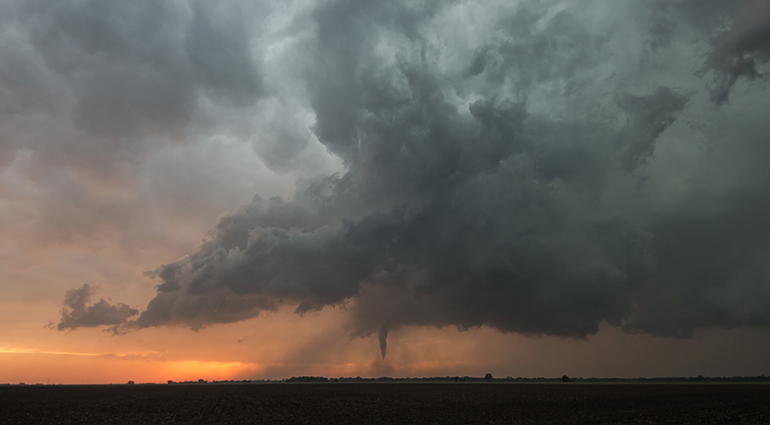Shelter from the Storm
But as for me, how good it is to be near God! I have made the Sovereign
When I lived in Oklahoma I had a friend who “chased” tornados. John tracked the storms carefully through radio contact with other chasers and local radar, trying to keep a safe distance while observing their destructive paths so he could report sudden changes to people in harm’s way.
One day a funnel cloud changed course so abruptly John found himself in grave danger. Fortunately, he found shelter and was spared.
John’s experience that afternoon makes me think of another destructive path: sin in our lives. The Bible tells us, “Each person is tempted when they are dragged away by their own evil desire and enticed. Then, after desire has conceived, it gives birth to sin; and sin, when it is full-grown, gives birth to death” (James 1:14–15).
There’s a progression here. What may at first seem harmless can soon spin out of control and wreak havoc. But when temptation threatens, God offers us shelter from the gathering storm.
God’s Word tells us He would never tempt us, and we can blame our choices only on ourselves. But when we “are tempted, he will also provide a way out so that [we] can endure it” (1 Corinthians 10:13). As we turn to Him and call on Him for help in the moment of temptation, Jesus gives us the strength we need to overcome.
Jesus is our shelter forever.
Lord Jesus, You conquered sin and death forever through Your cross and empty tomb! Help me to live and thrive in the forgiveness only You can give.
INSIGHT
As this passage in James 1:12–18 clearly teaches, God does not tempt us. Yet in this life temptations are sure to come. In fact, God may permit temptation in order to strengthen our faith as well as our dependence on Him. It’s an immeasurable comfort to know that our heavenly Father will “provide a way out” of temptation, as promised in 1 Corinthians 10:13. But what do we do in those times when we’ve made a mess of things?
It’s always best to run to our Father the moment we’re faced with temptation. But we can turn to Him at any point, even—especially—if we are trying to run from Him. Our God is such a loving and gracious Father. We can always come to Him.
To keep from getting to a point of desperation, it might be wise to ask ourselves these questions: Where do my temptations typically come from? What things might I need to get rid of that cause me to be tempted? Do I have trusted accountability partners to help me in my faith journey?











